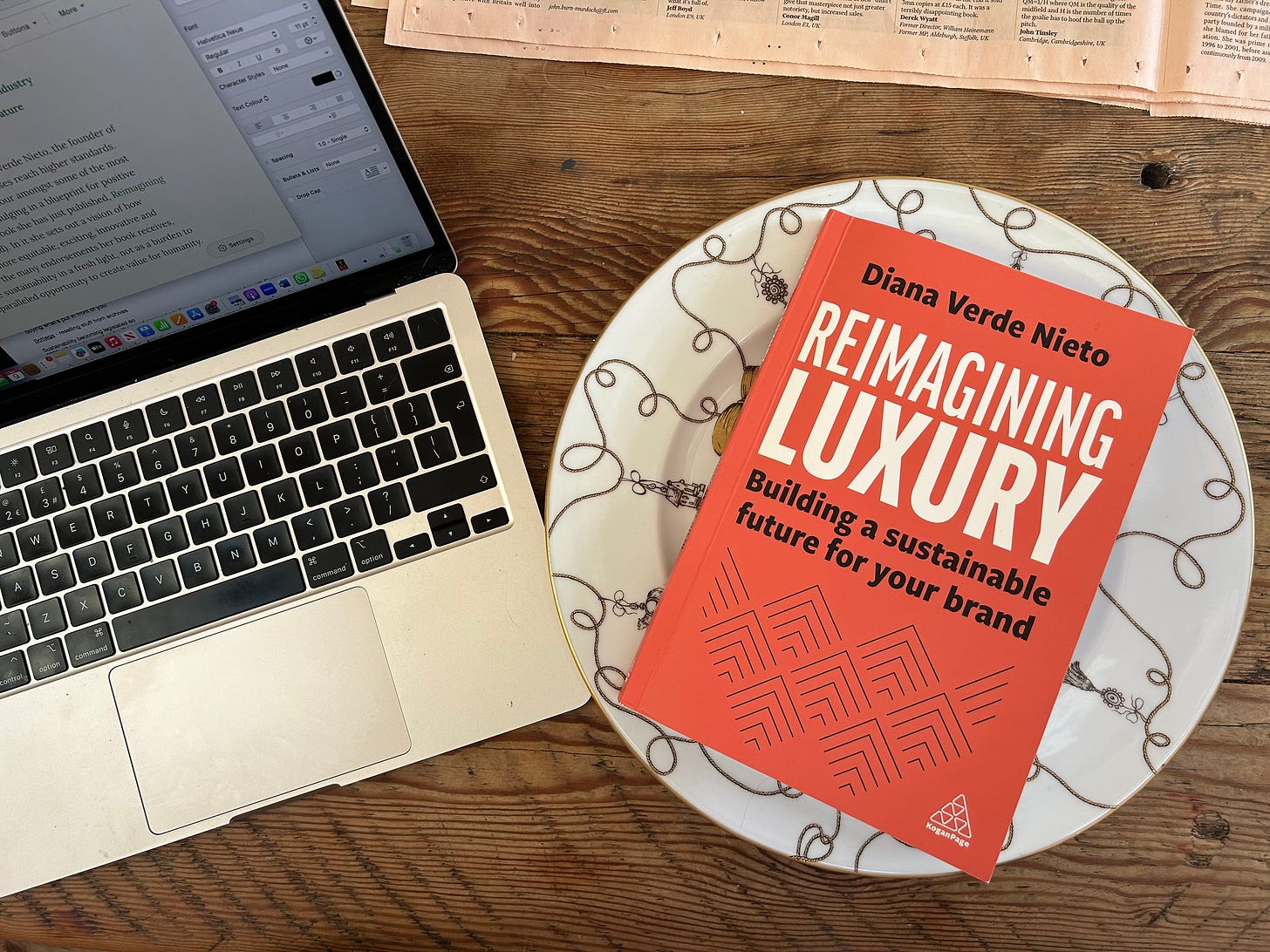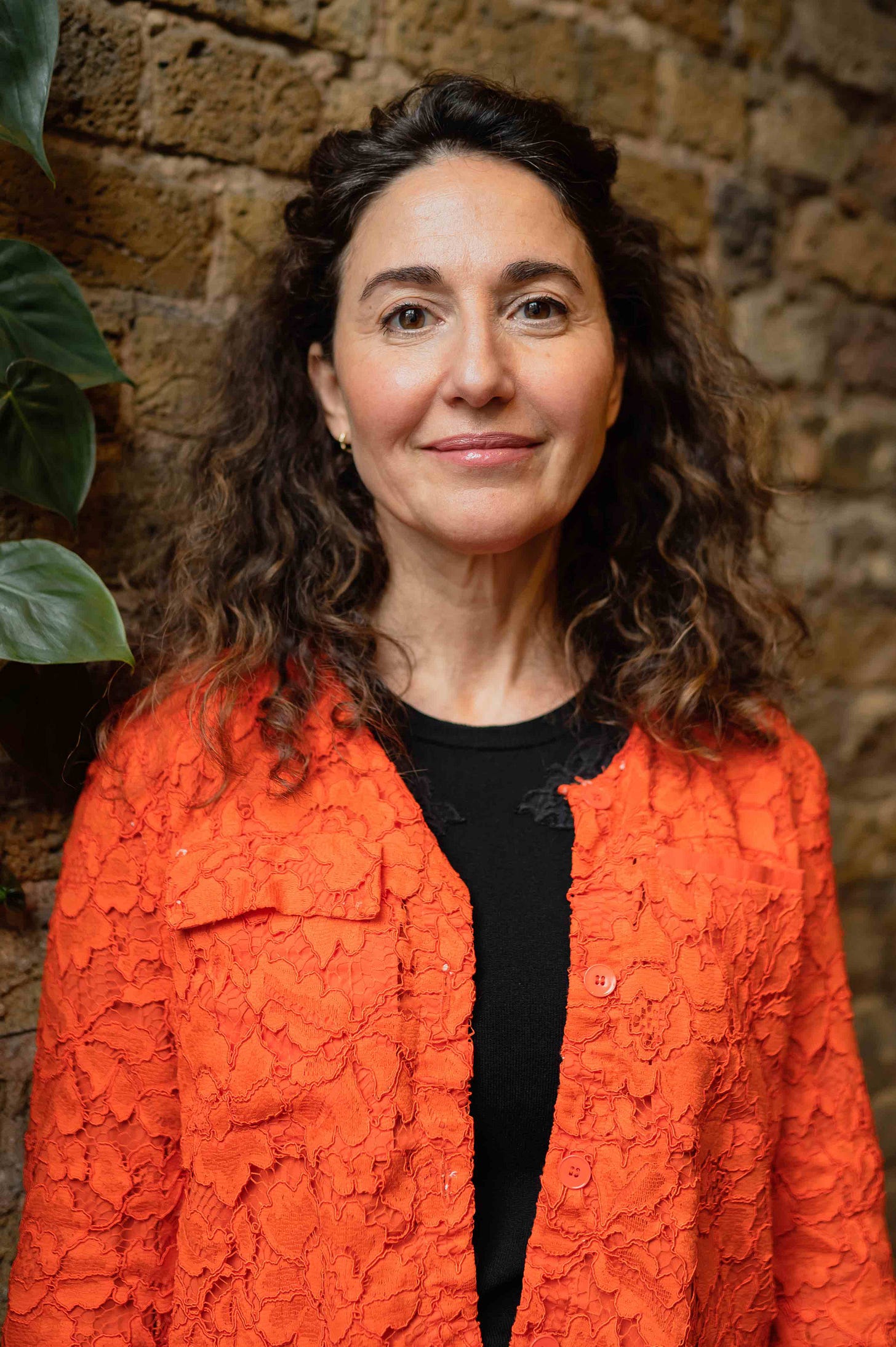Who Can See the Future?
We need a vision of the future we can all get behind. How Dior Parfums, Victoria Beckham and Bottega Veneta are powering the story
Over the Christmas holiday I read Anthony Doerr’s latest novel, Cloud Cuckoo Land, (he of All the Light We Cannot See). It’s fabulous, the epic tale of five generations of the human race chasing the Elysian uplands of a better future, and in between all the sherry and mince pies it was a poetic reminder of what drives the human race. Hard recommend.
I bring this up because as we round the year in, it's plain to see we are lacking vision. The narratives of anxiety, fear and risk aversion are holding us back. Where are the artists, poets and thinkers who can drive us forward? Doerr’s vision of the 2070s was apocalyptic, I finished it feeling bereft. And yet the Industrial Revolution would not have happened without Isaac Newton and Francis Bacon championing a progress oriented view of the world. The creative oomph Tony Blair ushered in when a whole generation stayed up all night singing “Things can only get better’ allowed our creative services sector to swell by 1.5 times the rate of the rest of the economy. The joy and power we all felt seeing Michelle Obama standing on the steps of the White House, decked out in the finest luxury brands, powered the fourth wave of feminism. We cannot be what we cannot see. We are talking ourselves into a doom laden universe when actually, if you talk to a scientist, they will matter-of-factly tell you we have all the solutions we need right now. We just need to get them out there.
Two headlines from this week (and it’s only Tuesday): “How British scientists plan to ‘refreeze’ Arctic sea ice” and “A new age of nuclear fusion may finally be about to dawn.” Cloud Cuckoo Land? I don't think so.
It’s Not Sustainable is dedicated to powering positivity and progress in fashion and luxury. To all my new subscribers, a warm welcome, it’s wonderful to have you here. If you would like to upgrade your subscription, you’ll get invited to nice events (first invite of the new year below) and you can access all the industry changing solutions we highlighted last year.



One woman who would agree on a more positive version of the future is Diana Verde Nieto, founder of Positive Luxury, an agency that helps businesses reach higher standards. Their butterfly mark is now a badge of honour amongst some of the most famous luxury brands. If you feel like indulging in a blueprint for positive progress, then pick up a copy of the book she has just published, Reimagining Luxury. (Subscriber discount: see end). In it she sets out a vision of how businesses can transform for a more equitable, exciting, innovative and inspirational future. One of the many endorsements her book receives, states: “Diana helps you see sustainability in a fresh light, not as a burden to bear, but rather as an unparalleled opportunity to create value for humanity. That is a real luxury.”
Before we tuck into how Victoria Beckham and Dior Parfums are saving the world (bear with me), let’s just address the luxury aspect, (Ok, doomer). Diana is Argentinian, a country currently suffering from 58% inflation, where 40% of kids only eat one meal a day. As she says, if you ask an Argentinian about their idea of luxury, it’s unlikely to be Pharrell’s Damo print. Depending on who you talk to, you’ll get ‘health’, ‘time’ or ‘love’. And this is true all over the world. Luxury is a universal aspiration, a unifying connector we share across the human race, and while interpretations of luxury may differ, luxury is always aspiration, and as humans aspiration - dreams - are what we need to propel ourselves forward.
“I wrote the book because I have been very lucky to learn both languages: that of the developing world and the developed world,” says Diana. “That intersection, of developing, and also helping others develop is where we can make a better environment, a better everything. Luxury opens doors.”
What Diana has discovered over the years she has worked in the sector (and she is a legend in boardrooms - Marie Claire Daveu, Chief Sustainability Officer, at Kering, Sabrina Elba and Idris Elba, Founders of Sable Labs, Chantal Gaemperle, Group Executive Vice President at LVMH, George Kern, the CEO of Breitling and Stephanie Phair, Group President, Farfetch, all contributed to her book), is that the luxury business model affords the opportunity to be better. Luxury can dream. “It's not about cutting, but adding,” explains Diana. “The whole culture of less is not incrementally positive. If you think about government cuts, this makes the country poorer. But if you invest in innovation, if you invest in collaboration, if you look at sustainability and innovation working hand-in-hand, then you move into a culture of more.”
The biggest shift we need to make, says Diana, is moving from a mindset of less into a mindset of abundance. From austerity to positivity. Diana is from Generation X - born in the seventies, grew up in the 80s, had far too much fun in the 90s and flourished in the naughts. This generation was born and raised in a world of positivity and progress. “When we were young, our future was: you get married, you have kids, you go to university, you live in another country, you travel. You had an idea of the world, and although you knew it was going to be hard, you kind of knew what you wanted to do, where you were going and that it was achievable. Your parents did it, so why couldn't you? But now where is the coherent, positive vision of the world?”
The book uses Diana’s own experience guiding businesses to abundant futures to show myriad ways of how this can be done. “If you look at brands like Stella McCartney or Victoria Beckham, they are turning up profits because they're doing less. They're doing less better. It is easier to run a business with less at the right price at better quality.” She points to the precarious nature of raw material prices as exposing businesses to danger. If you buy enough cotton to make 100 t-shirts and they all sell out, but now your cotton price has jumped, what do you do? You don’t make any more. See Phoebe Philo’s made to order business model. Plus you’re getting on top of your waste problem. How are you turning up profits? “Diversification,” says Diana. Victoria has moved into make up, Stella has her beauty, and now ski wear. “Then you go from a linear economy to a circular economy. Renting, reselling, repurposing, swapping.” Trading sites in the US that allow you to swap your sweater with my hat, where no money changes hands except a $2 commission to the company, are really taking off, Diana reports enthusiastically, (I’ll do more on these in a few weeks).
Bottega Veneta is singled out for reselling its archive. LVMH for its innovation challenge. They ask their own employees to solve their problems, then empower them to see it through - giving birth to successful businesses like Nona Source, (which sells deadstock LVMH materials). Fendi and Chanel are praised for buying up their factories: “They clean them up, put in the best technology, produce on them, and then they open source them so anybody else can use them. That upgrades infrastructure, cleans up pollution and safeguards employees.”
Dior Parfums is an exemplar of her abundance philosophy. “They have all the challenges every other brand has. They went right into the source, which is the fields, and looked at how they could create efficiency to extract the maximum amount of flowers and do it in a way that is sustainable, incentivising employees, making sure nature has time to replenish and repair, and leaning into biotech to top up. How does business affect the outcomes of the planet? In the case of Christian Dior perfume, they can quantify how many women, how many flowers, how many hectares, how many saved litres of water have positively impacted the world. As a business they are now talking the language of net positive.”
This is not the way Dior Parfums market themselves. You don’t see them trumpeting sustainability as a reason to wear Miss Dior. It’s still Natalie Portman wandering romantically through the streets of Paris, because they are selling a dream. People buy luxury out of desire, not wanting to do the right thing. Anyway, Diana thinks, sustainability storytelling will soon be a thing of the past because legislation is coming (in the EU and the US) mandating net positive practise. Everyone will have to do it, and those businesses that aren’t will cease to trade in the west.
The problem is the preparation needed to get business (and society) fit for net positive requires future thinking. “If you plant a tree it’s not because you're going to sit down in the shade. You plant a tree knowing you will never see the fruits of that tree, but your kids will. You know, trees take a long time to grow.”
The book goes on to single out vineyards, lightbulb manufacturers and even streaming platforms to demonstrate how we can build a better future. “We live in a world that we invented. Nobody has imposed this on us. We made it this way. We can do it. We just need to have the courage to be able to to get out of our chairs and do it without complaining!”
We desperately need more Dianas. Where are all the artists in the world, all the filmmakers, the novelists, who can dare us to dream? Who can show us a language and culture of positivity and imagination that can propel us to success? And by the way, the scientists have the answers.
If you would like to come and have breakfast with Diana and I at Koko, London later this month, then please subscribe if you haven’t already, so you can hop below the paywall line and apply. I’ll be asking Diana to delve deeper into her solutions, but also you’ll get a chance to meet a truly beautiful and visionary thinker. I’ve also got a 20% discount code there too if you would like to purchase her book - which I also hard recommend.
Until next week,
Tiff



